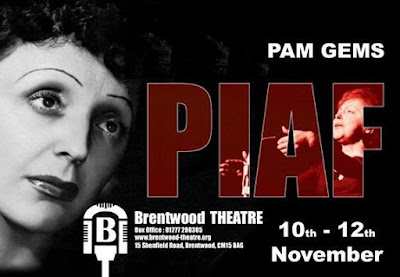ROCK OF AGES
Southend
Operatic and Dramatic Society at the Palace Theatre Westcliff
18.11.16
An unabashed
juke-box musical, showcasing the greatest glam metal merchants of the
80s. Though not, as it turned out, the title number from Def Leppard.
And it brought a
diverse crowd to the Palace to have their faces melted at the
tea-time matinée: rockers, pensioners, school-kids enthusiastically
supporting their mates.
The balance
between tribute, parody, humour and love-interest is a delicate one,
but SODS serve up their usual very professional production values,
and give this slight story a more than decent outing.
The eighties hits
are strung out on a thin line of plot. The usual things – dreams of
stardom, threat from heartless developers, a naïve girl torn between
fame and true love. Taking us back to sexier times ? Well, more
sexist, certainly …
The show is
driven by the music, excellently done by the on-stage “Arsenal”,
with new MD Keeley Wickham on keys. The nature of the unsubtle
eighties sound means that dialogue sometimes has to be shouted over
the underscore, and the lyrics are occasionally hard to catch. The
numbers, or at least the titles, are loosely tied to the narrative,
and the colourful chorus sometimes seems to comment on events.
There's little conventional choreography [Vicky Wyatt] – the two
finales come closest, with ironic jazz hands at the end of Act One –
Whitesnake's Here I Go Again. Many of the numbers are given a
dramatic twist; all of them are compellingly performed. A trio, later
joined by Stacee and the girls, for Styx's Too Much Time On My Hands,
a duet for Damn Yankees' High Enough amongst the highlights.
The versatile,
talented company take the rock genre in their stride, led by David
Watkins and Milli-Mae Cage as the love interest, brought together by
a shared taste for slurpees.
Plenty of
broad-brush character work from, amongst others, director Ian Gilbert
as the villainous Hertz, Ewan Dunlop as his OTT effete offspring, Les
Cannon as the club owner, enjoying an Oscar moment – one of the few
real speeches in the show – and elevation to the angelic choir at
the end. He was also the voice of Ozzy Osbourne before curtain-up.
The preening rock
star Jaxx, skin-tight leggings to attract the groupies, is played
with evident relish by Nick Bright, and Heather Cooper brings
strength of character and a fine voice to city planner turned protest
leader Regina. A subtler, but no less effective performance, with no
histrionics, from Phie Carlile as Justice Charlier, proprietor of the
Venus Club strip joint.
The show is held
together by the sound guy/MC/narrator/dramatic conjuror Lonny,
brilliantly done by Jonny Buxton in a mullet, guying the genre,
working the audience, interfering and generally being annoying,
though not as annoying as Russell Brand.
The staging is
simple – cut-away wall, the band upstage, the Bourbon Club. An
ingenious fold-out platform brings us the men's bathroom, the
planner's office …
Not the best of
the juke-box musicals, but hard to imagine it better done on the
non-professional stage, a good night out for rock aficionados and
musical theatre fans alike.














